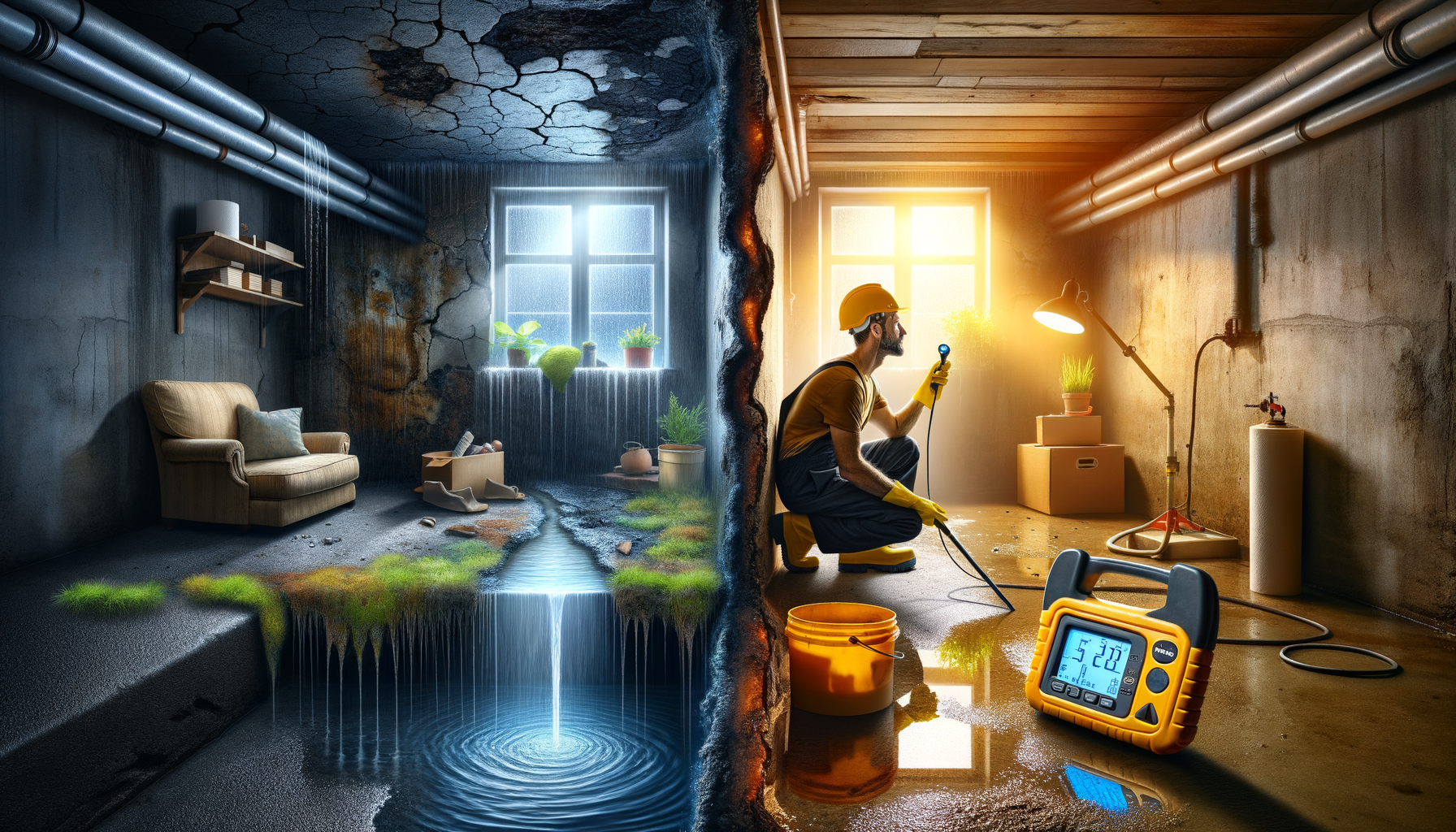Introduction
Imagine This
Ever wake up to find your basement floor all wet? It’s a common, scary problem for many homeowners and can get really expensive if you don’t fix it fast.
Why Your Foundation Matters
Think of your home’s foundation like its backbone. If it’s not strong, you can get big problems like cracked walls and uneven floors. If your foundation leaks, it could hurt your home’s safety and value.
What You’ll Learn
In this guide, we’ll talk about the types of foundation leaks, why they happen, how to quickly fix and prevent them, and real-life stories from other homeowners. Knowing these things will help you take care of foundation leaks better.
Knowing About Foundation Leaks
Types of Leaks
- Cracks in Basement Walls: These can be small or big cracks you can see easily.
- Floor Cracks: Cracks in the basement floor that let water in.
- Leaking at the Wall-Floor Joint: Water can get in where the wall meets the floor because of water pressure outside.
Why Leaks Happen
- Bad Drainage: Poor drainage makes water gather around your foundation.
- Water Pressure: Water pressure builds up in the soil and pushes water into your foundation.
- Moving Soil: Some soils expand and move, cracking the foundation and letting water in.
Signs You Have a Leak
- Damp Spots in the Basement
- Water Stains
- Mold Growing
- Bad Smells
- Visible Cracks
What to Do If You Think You Have a Leak
Check the Problem
- Look Around: Check for damp spots, water stains, and visible cracks.
- Use Moisture Meters: These tools measure moisture in areas you suspect.
- Check for Mold: Look for mold or mildew and smell for bad odors.
Quick Fixes
- Waterproof Sealant: Use this to stop moisture from getting in for a short time.
- Epoxy Injection: Fill cracks to keep water out temporarily.
- Sump Pump: Great for getting rid of lots of water quickly.
Fixing Leaks for a Long Time
Get Professional Help
- Hire a Structural Engineer: They can inspect and tell you what’s wrong.
- Damage Check: Get a detailed look at the damage.
- Repair Plan: Get a plan from the professionals on how to fix it.
Ways to Fix It
- Crack Injection: Fill cracks with epoxy or special foam.
- Interior Waterproofing: Set up systems inside to control water.
- Exterior Waterproofing: Dig around the outside and apply membranes to keep water out.
- Underpinning: Strengthen the foundation so it doesn’t move and crack again.
Stopping Future Leaks
Better Drainage
- Gutter Extensions: Move water away from your house.
- Yard Grading: Make sure your yard slopes away from the foundation.
- French Drains: Use these to manage water around the foundation.
Regular Checks
- Yearly Inspection: Look for early signs of trouble each year.
- Clear Gutters: Make sure gutters aren’t blocked.
- Watch Soil Moisture: Keep an eye on the soil moisture around your house.
Stories from Homeowners
Real Experiences
- Fixed Foundation Cracks: Stories from homeowners who fixed cracks and avoided more damage.
- Benefits of Professional Repairs: Examples showing how pro repairs made homes last longer.
- Ignoring Early Signs: Tales of those who waited to fix leaks and had big problems later.
Conclusion
Key Points Recap
Fixing foundation leaks is essential to keep your home strong. From spotting signs to doing both quick and long-term fixes, acting quickly can save you lots of money on repairs.
Take Action
Don’t wait! Regular maintenance and professional checks will help keep your foundation solid.
Next Steps
If you think you have a leak, get expert help right away. Your home’s safety is at risk.
Extra Info
More to Read
- Home Maintenance Articles
- Books on Foundation Repair
How to Find Help
- Local Contractors
- Engineers and Inspectors
FAQs
- How much does it cost to fix foundation leaks?
- It varies a lot, depending on the problem and how you fix it.
- How long do repairs last?
- Good repairs can last for many years if you take care of them.
- Can I fix leaks myself?
- You can do some temporary fixes, but it’s best to get professional help for permanent solutions.
- How do I find a good contractor?
- Look for licensed contractors with good reviews and references.
- What materials are best for repairs?
- Common ones are epoxy, special foam, and waterproof membranes.
- Will my insurance cover repairs?
- Check your policy, as coverage varies.
- How do I know if my leak is serious?
- Major water damage, big cracks, and lots of mold are bad signs.
- What happens if I don’t fix a leak?
- You might get structural damage, lose property value, and face costly repairs.
- How does weather affect leaks?
- Freeze-thaw cycles, heavy rain, and drought can all affect your foundation.
- Do all cracks mean leaks?
- Not always, but you should check all cracks to be sure.
This simple guide gives you the knowledge and confidence to deal with foundation leaks, helping keep your home safe and strong.


Leave a Reply